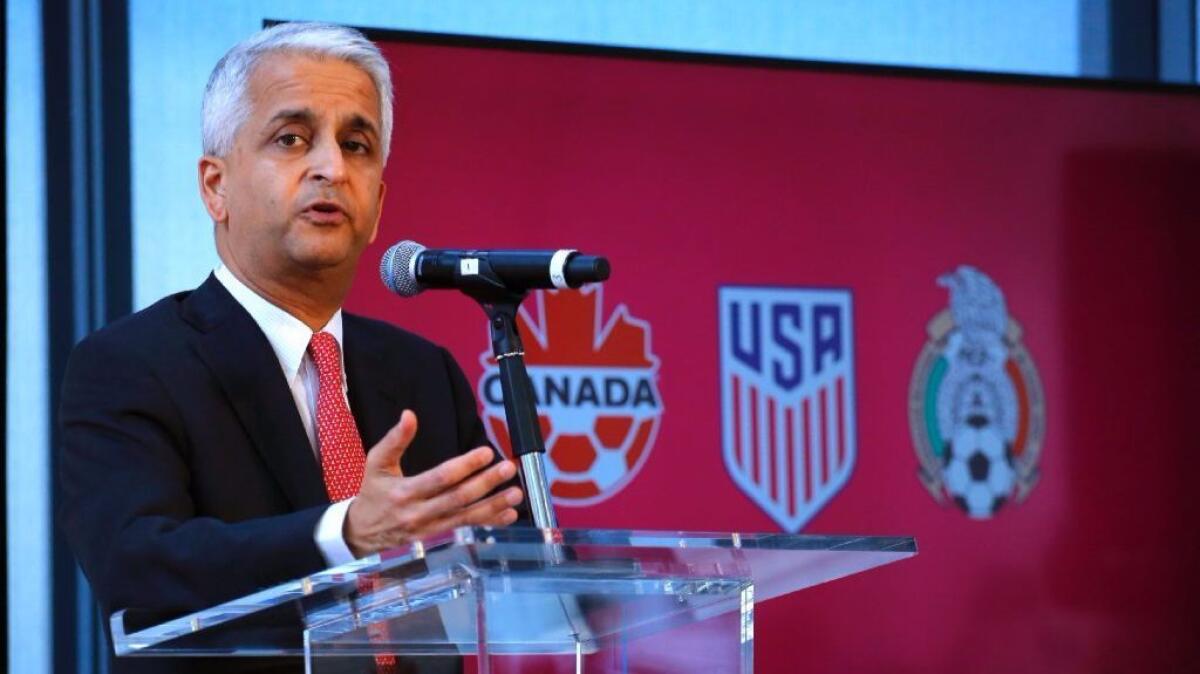U.S., Mexico and Canada announce joint World Cup 2026 bid

At a time when the political leaders of the United States, Mexico and Canada are talking about barriers, the presidents of the soccer federations from the three countries joined in unity Monday, declaring their intention to submit an unprecedented three-nation bid to host the 2026 FIFA World Cup.
The announcement was made with considerable fanfare in the 102nd-floor observatory of One World Trade Center, which offers breathtaking views of New York Harbor and the Manhattan skyline.
Sunil Gulati, president of the U.S. Soccer Federation, said talks with Canadian Soccer Assn. president Victor Montagliani and Mexican soccer president Decio de Maria have quietly taken place over the last four years, with all three executives agreeing a unified North American effort to put on world soccer’s most prestigious event could be as symbolic as the Statue of Liberty, glimmering in the harbor behind him.
“We’re not going to get too much into politics today,” said Gulati, who nonetheless added that “President Trump is fully supportive of the joint bid and is especially happy that Mexico is participating in this joint bid with us.”
Gulati said 60 of the tournament’s 80 games will be played in the U.S. with 10 each scheduled for Mexico and Canada. All quarterfinal games will be played in the U.S. Among the likely candidates for the final is the Rams’ proposed new home in Inglewood.
With Los Angeles also a finalist in bidding for the 2024 Olympics, Southern California could find itself at the center of the two largest events in international sports only two years apart, following Brazil, which put on the 2014 World Cup and the 2016 Rio Games.
“This is a milestone day for U.S. Soccer and for CONCACAF,” Gulati said, referencing the regional confederation that oversees soccer in North America, Central America and the Caribbean. “We gave careful consideration to the prospect of bidding for the 2026 FIFA World Cup, and ultimately feel strongly this is the right thing for our region and for our sport.
“Along with our partners from the Canadian Soccer Assn. and the Federacion Mexicana de Futbol, we are confident that we will submit an exemplary bid worthy of bringing the FIFA World Cup back to North America.”
With the tournament expanding in 2026 to a record 48 teams and 80 games, there will be logistical headaches, problems that could be exacerbated by playing games in three countries. Only the 2002 World Cup in South Korea and Japan has had multiple hosts.
In addition FIFA, the world governing body for soccer, is certain to seek assurances from the U.S. that players, staff and fans would not face any undue burden in traveling to games in the U.S. The Trump administration has twice proposed travel bans temporarily barring visitors from half a dozen Muslim-majority nations. The bans have been struck down by the courts but the administration has called for additional vetting for travelers from several nations.
“We have very specifically addressed this with the president,” Gulati said.
The continent has played host to World Cups, in 1970 and 1986 in Mexico and in 1994 in the U.S., with the 1994 tournament setting records for attendance. Canada put on the 2015 Women’s World Cup.
And though the U.S. possesses the infrastructure and organizational know-how to organize even an expanded World Cup on its own, Gulati said a united proposal “makes our bid stronger.”
“We don’t think sports can solve all the issues of the world,” he said. “But especially with what’s going on in the world today, we think this is a hugely positive signal and symbol of what we can do together in unifying people, especially in our three countries.”
A three-country bid also protected the U.S. from having to fend off a rival proposal from Mexico, which had expressed interest in putting on the 2026 event, becoming the first nation to play host to three World Cups.
Rafael Ocampo, a sports columnist for Mexico’s Milenio newspaper, said he sees the union among the countries primarily as a logistical strategy rather than a political statement.
“If Mexico wanted to host by itself, I don’t think it’s prepared for that,” Ocampo said.
Still, Ocampo said, the large numbers of fans traveling between the three countries will require temporary fluidity across the borders.
“Even though there’s been an increase in the number of soccer aficionados in the United States, a huge percentage of the fans in the stadiums are going to be Mexican,” Ocampo said.
The fate of that joint bid announced Monday won’t be known until May 2020, when FIFA executives vote to award the rights to the 2026 tournament. However, World Cup bidding rules approved by FIFA’s ruling council make it likely the joint North American proposal will prevail.
Under the guidelines, regional confederations that have hosted a World Cup are prohibited for bidding on another for at least eight years. With Russia playing host to next year’s World Cup and Qatar doing so in 2022, the European and Asian federations are ineligible for consideration for 2026, sidelining England and China, which had expressed interest in the tournament.
Staff writer Kevin Baxter reported from Los Angeles; Haller, a special contributor, reported from New York. Laura Tillman contributed to this story from Mexico City.
Twitter: kbaxter11
More to Read
Get our high school sports newsletter
Prep Rally is devoted to the SoCal high school sports experience, bringing you scores, stories and a behind-the-scenes look at what makes prep sports so popular.
You may occasionally receive promotional content from the Los Angeles Times.







